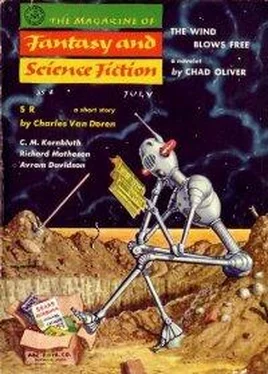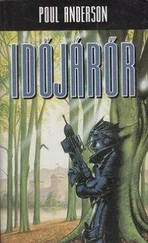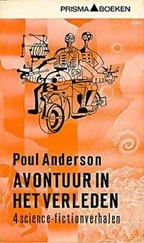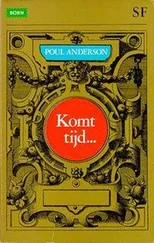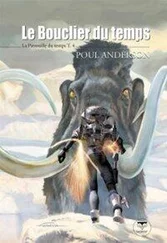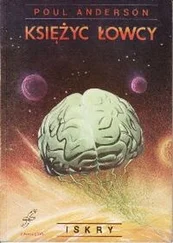No answer. That probably meant the Twonk didn’t know either.
“You could at least let us have back our control rings and enough food for the journey home. I assure you, we would leave at once.”
“No.” The voice was alike empty of rancor and mercy. “It is required that you die. The next strangers to come will, then, not be forewarned, and we can dispose of them too. This land will be shunned.”
“If we get desperate enough, we will start fighting you. We will kill many.”
“That I—we do not understand. We are letting you die this way because it is easiest. If you fight us, then we shall fight you and overwhelm you with numbers; so why do you not die without making useless trouble for yourselves?”
“That isn’t in our nature.”
“I—we do not know what you mean by ‘nature.’ Every She, when she has laid as many eggs as she can, goes out to the sun and returns to those which you name gods. Death is a correct termination when there is no further use for the organism.”
“Men think differently,” said Navarro. “Of course, as a more or less good Catholic, I consider my body only a husk—but I still want to keep it as long as possible.”
No reply, except for some crackling gibberish. The Mercurians were talking to each other. Weaker overtones made Kingsbury suspect that several Twonks within the hive were joining the discussion—or the stream of consciousness, or whatever you wanted to call the rumination of a semicollective mind.
“Look here, my friend,” said Navarro. “You know our purposes. We want to get certain minerals from you. You have no use for them, and we would pay you well, in tools and machinery you cannot make for yourselves.”
“It would be mutually advantageous,” agreed the Twonk. “When the first ship came, we considered it an excellent idea. But since then the gods have told us your sort must not be allowed to live.”
“ Por Dios! Why?”
“The gods did not say.”
“You serve these gods,” said Navarro harshly. “I believe you give them food—right? And tools and anything else they want. You obey their least whim. What do you gain from them?”
No answer.
“Can we talk to these gods? Maybe we can persuade them—”
“It is forbidden you to see the Living Light.” Another conference. “Perhaps you will agree to die and stop bothering us if we tell you the gods are needful to our life. They give us pure metal—”
“Most of which you make into tools for them,” snapped Navarro. “We could do the same for you.”
“That is a small thing. But the gods are needful to our life. It is the gods who put life into our eggs. Without them no young would be hatched. It is thus necessary that we obey them.”
“Cut it out, Juan,” snarled Kingsbury. “I’ve been through this rigmarole a hundred times. It’s no use.”
Navarro nodded absentmindedly and trudged off. They switched to a different radio band, one the natives could not “hear,” but said nothing for a while.
“Has it ever occurred to you,” asked Navarro finally, “that nobody has ever seen a male Mercurian?”
“Sure. They’re hermaphrodites.”
“That was assumed by the first expedition. An assumption only, of course. They could not vivisect a live Twonk—”
“ I sure could!”
“—and the old ones all go out on Dayside to die. The only chance for anatomical studies would be to find one which had met a violent end here in Twilight, and there was always too much else to do.”
“Well, why shouldn’t they be hermaphrodites? Oysters are.”
“At certain times of the year. But oysters are a low form of life. On Earth, Mars, and Venus, the higher one goes on the evolutionary scale, the more sharp the distinction between the sexes.”
“All right, maybe their males are very small.”
“As with some fish? Possibly. But most improbable. All their eggs are about the same size, you know.”
“Who cares?” snorted Kingsbury. “I just want to go home.”
“I care. I have a tidy mind. And, too, Earth needs that uranium and thorium. We will never get it unless we can circumvent this religion of theirs, either by persuading the gods or by… hm… destroying the cult. But to accomplish the latter, we will first have to understand the creed.”
They came out on a road of sorts, a narrow track in the shale, stamped out by thousands of years of feet. There were natives working in the fields, and before the hive they could see smiths hammering cold iron and copper into implements. A few young were in sight, unhumanly solemn at their play. None paid any attention to the outworlders.
Navarro pointed to a smith. “It is true what the Twonk said, that the gods supply their metal?”
“Yes,” said Kingsbury. “At least, so I’ve been told, and I do think the Twonks are unable to tell a lie. Being radio-telepathic, y’know, they couldn’t lie to each other, so the idea would never occur to them.”
“Hm… they do not have fire here, not in this sleazy atmosphere. They must have been in a crude neolithic stage until the gods started smelting ores for them. I imagine that could be done with mirrors focusing the Dayside heat on—oh, a mixture of crushed hematite and some reducing material.”
“Uh-huh. And the gods get the pick of whatever the Twonks make out of the metal.” Kingsbury cleared his throat to spit, remembered he was in a space suit, and swallowed. “It’s perfectly clear, Juan. There are two intelligent races on Mercury. The Daysiders have set up in business as gods. They don’t want humans around because they’re afraid we’ll spoil their racket and make ’em work for a living.”
“Obviously,” said Navarro. “The problem is, how to convince the Twonks of this? To do that, we shall first have to study the nature of the Dayside beings.”
They mounted a razorback ridge and clapped down glare filters. Before them was the sun.
It burned monstrous on the horizon, a white fury that drowned the stars and leaped back off the withered land. Even here, with shadows lapping his feet and the refrigeration unit at full blast, Kingsbury felt how the heat licked at him.
“God!” he whispered. “How far can we go into that blazing hell?”
“Not very far,” said Navarro. “We shall have to hope some Twonks died close by. Come!” He broke into long low-gravity bounds, down the slope and out onto the plain.
Squinting through tormented eyes, Kingsbury made out a shimmering pool at the horizon. It spouted as he watched… molten lead? With the speed he had and the sharp curvature of the surface, the sun was rising visibly as he ran.
Even here there was life. A crystalline tree squatted near a raw pinnacle, stiff and improbable. A small thing with many legs scuttered away, shell too bright to look at. Basically, Dayside life had the silicate form of-Twilight, many of the compounds identical-—a common ancestry a billion years ago, when Mercury still had water—but this life was adapted to a heat that made lead run liquid.
“This… road… goes on,” panted Kingsbury. “Must be… a graveyard… somewhere…”
His skin was prickling now, as charged particles ate in through the armor. His underclothing was limp with sweat. His tongue felt like a swollen lump of wood.
This was farther into Dayside than men had ever gone before. Through the dizziness, he wondered how even a Twonk could survive the trip. Only, of course, they didn’t. The natives had told the first expedition that their old ones went out into the sunlight to die. There’d be no one to bury them, and the shells weren’t volatile—
He stumbled over the first one before he knew it. When his gauntlets touched the ground, he yelled. Navarro pulled him up again. There was a dazzle in their helmets, they squinted and gasped with dry lungs and thought they heard their brains sizzling.
Читать дальше
